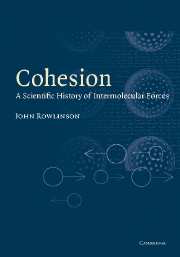2 - Newton
Published online by Cambridge University Press: 27 July 2009
Summary
Newton's legacy
The natural philosophers of the eighteenth century knew Newton's work [1] through his two books, the Principia mathematica of 1687 [2] and the Opticks of 1704 [3]. His belief in a corpuscular philosophy is clear in both, and is particularly prominent in the later editions of the Opticks, but the cohesive forces between the particles of matter are not the prime subject of either book. Together, however, they contain enough for his views on cohesion to be made clear. We, who are now privy to many of his unpublished writings, know how much more he might have said, or said earlier in his life, had he not been so fearful of committing himself in public on so controversial a topic. He was not the first to speculate in this field but his views were better articulated than those of his predecessors [4] and, what is perhaps more important, they carried in the 18th century the force of his ever-increasing authority. It was his vision that was transmitted to the physicists of the early 19th century, and we examine first the legacy that he left to his philosophical heirs. The account is restricted to the subject in hand; that is, how does matter stick together, and wider aspects of Newton's thought remain untouched.
In the Preface to the Principia he describes the success of his treatment of mechanics and gravitation, and then continues:
I wish we could derive the rest of the phaenomena of Nature by the same kind of reasoning from mechanical principles.[…]
- Type
- Chapter
- Information
- CohesionA Scientific History of Intermolecular Forces, pp. 8 - 82Publisher: Cambridge University PressPrint publication year: 2002



